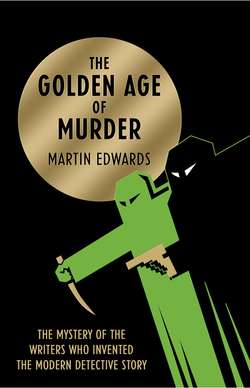Читать книгу The Golden Age of Murder - Stephen Bach, Martin Edwards - Страница 22
Notes to Chapter 3
ОглавлениеEdith Thompson never believed she would really hang
Among the many accounts of the Thompson–Bywaters case (which, as is invariably the way with discussion of past cases, contain much conflicting information) I have found René Weis’s Criminal Justice especially useful.
in George Orwell’s phrase, the end of an ‘Elizabethan Age’ of English murder
See Orwell, ‘Decline of the English Murder’, Tribune, 15 February 1946.
Anthony Berkeley was appalled by Edith Thompson’s fate.
For convenience, I refer to authors such as Berkeley, Henry Wade, John Rhode, Milward Kennedy, J. J. Connington, and Anthony Gillbert by their principal pseudonyms; they were for the most part known to their fellow Detection Club members by their pen names rather than by their real names. Sometimes their novels appeared under alternative titles, typically when an American publisher made a change. Titles mentioned in this book are generally those first used in the UK, although there are exceptions, notably Christie’s And Then There Were None.
In Berkeley, wit, charm and flair warred with demons.
Information about Berkeley’s life is notoriously hard to come by, and I am indebted to Malcolm J. Turnbull (author of Elusion Aforethought), George Locke (author, under the name Ayresome Johns, of a slim but informative volume about Berkeley’s writings), Arthur Robinson, Tony Medawar, and members of Berkeley’s family for supplying material that has proved invaluable in writing this book. Medawar and Robinson (jointly) and Locke have written informative introductions to two collections of Berkeley’s shorter work, The Avenging Chance and other Mysteries from Roger Sheringham’s Casebook, and the privately published The Roger Sheringham Stories respectively. William F. Stickland’s chapter ‘Anthony Berkeley Cox’ in Earl F. Bargainnier’s Twelve Englishmen of Mystery, and the sources he quotes, also offer useful insight.
Julian Symons … believing that Berkeley’s ‘ruddy-faced geniality’ concealed a disturbingly shy and secretive character.
Symons’ posthumous memories of Berkeley, quoted in Elusion Aforethought, appeared in an obituary for The Sunday Times on 14 March 1971, and in the Times Literary Supplement of 10 March 1978.
‘Detection and crime at its wittiest’, Agatha Christie said.
In ‘Detective Writers in England’; see CADS 58, December 2008, and below.
The glamorous Christianna Brand … said he once confided that there was ‘not one soul in the world he did not cordially dislike’.
Christianna Brand (1907–1988), a distinguished post-war practitioner of books in the Golden Age tradition, had mixed feelings about Berkeley, which she expressed in private correspondence with a younger Detection Club colleague, Robert Barnard (1936–2013), and in several versions of an essay which appeared as the Introduction to The Floating Admiral, on the book’s republication in the US in 1979; see also Tony Medawar, ed., ‘Detection Club Memories: Christianna Brand’, CADS 52, August 2007.
as M. R. James said …‘The detective story cannot be too much up-to-date …’
In an Introduction he wrote in 1924 to Ghosts and Marvels, edited by V. H. Collins.
An odd connection arose between Berkeley and Christie
See Tony Medawar, ‘On This Day: 9 April 1926’, CADS 64, November 2012.
The newspaper offered a total of £500 in prizes to readers who provided the best answers to questions about the story
During the Golden Age, prize competitions linked to detective stories were highly popular. They can be cost-effective marketing devices – if carefully handled. In 1905, Edgar Wallace offered £1,000 in prize money for readers who solved the puzzle in his debut thriller, The Four Just Men, and found himself courting bankruptcy as a result. Almost sixty years later, Len Deighton’s second spy novel, Horse Under Water, included a crossword with clues which could be solved through reading the novel. The clues were printed on the endpapers of first editions, and readers were given ten days to complete the puzzle; the first ten to send in correct solutions were awarded book tokens.
